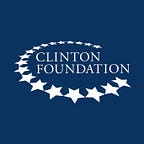Creating Renewable Energy from Organic Waste
Sistema Biobolsa, based in Mexico, has been a member of the Clinton Global Initiative (CGI) since 2013, when they made a Commitment to Action to install 1,000 waste-to-resources systems across five Caribbean islands. Alexander Eaton, co-founder and CEO of Sistema Biobolsa, works at the cross section of social justice and clean energy. Below is a behind the scenes look at how Sistema Biobolsa is turning animal waste into renewable methane gas through their unique funding model that alleviates poverty.
The dank smell and buzzing flies signal that we are where we should be. The worse the odor, the more we know that our Sistema Biobolsa waste-to-energy system is going to have a positive impact, whether we are at a small farm or in an urban slum. Within hours, our biodigesters can convert any organic waste stream — animal, human, or plant — into organic fertilizer for crops and biogas for cooking, heat, and electricity.
Our message is simple: there is no waste, only resources. Sistema Biobolsa leverages the buying power of rural farmers with KIVA credit and other development funds to install our patented waste-to-energy system in farms, homes, schools, clinics, community centers, and public latrines. Once installed, our users are able to repay micro loans with the economic benefits derived from the renewable energy and fertilizer. We provide long-term impact monitoring and reporting to continuously improve our work.
[[{“fid”:”7308",”view_mode”:”center_column”,”type”:”media”,”link_text”:null,”attributes”:{“alt”:”Sistema Biobolsa- ¿Qué es y cómo funciona un biodigestor?”,”class”:”media-element file-center-column”}[[{
In January, we completed round one of a Development Innovation Ventures grant in waste-to-energy research with USAID, the University of Maryland, Clemson University, and local universities and organizations in Haiti. Piloting three Sistema Biobolsa human waste projects for the first time, the results were similar to previous projects with farm waste. From what we saw, by using modern low-flush toilets that incorporate the Sistema Biobolsa model, human waste may also be safely and effectively used for energy. It addition, this process serves as a solution to public sanitation.
Through our CGI Commitment to Action, we have installed over 2,000 Sistema Biobolsa biogas systems in Latin America, recently doubling our initial goal. We have developed partnerships in Mexico, Central America, and the Caribbean, and will continue assisting those living without access to sanitation — with a goal of impacting both 1 million farmers and 1 million citizens.
[[{“fid”:”7311",”view_mode”:”center_column”,”type”:”media”,”link_text”:null,”attributes”:{“height”:”360",”width”:”540",”class”:”media-element file-center-column”}[[{
Photo credit: sistema biobolsa
The CGI member network and events provide a chance to frequently catch up with our partners, like the Kellogg Foundation, The Nature Conservancy, and Heifer International. We also participate in the Haiti Action Network to stay up to date with other development actors. These opportunities help us to learn critical insights from social entrepreneurs and organizations — many of which face similar challenges around the world. We always leave energized, with new ideas to improve on our commitment goals.
Our work, however, truly becomes a reality on rural coffee plantations in Honduras, health clinics and community centers in Haiti, and small farms in rural Mexico. A recent encounter at the CGI 2014 Annual Meeting led to a field visit and collaboration opportunity in Nicaragua. When we arrived at the site, it smelled horrible. We knew we were in the right place.
Check out the agenda for the 2015 Annual Meeting, which was held last week from September 26–29, to learn about the various sessions that discussed renewable energy and environmental sustainability. You can watch past sessions at live.clintonglobalinitiative.org.
